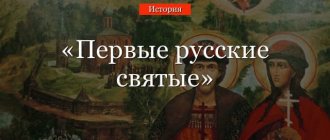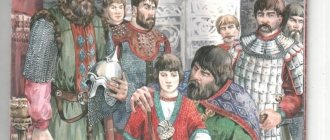On August 6, the Church honors the memory of the holy martyrs Boris and Gleb . The holy noble passion-bearing princes Boris and Gleb were the youngest sons of the holy Equal-to-the-Apostles Prince Vladimir of Kyiv. They were born shortly before the Baptism of the Russian Land and were raised in the spirit of the Christian faith. The eldest of the brothers, Boris, received a good education. Gleb shared his brother’s desire to devote his life exclusively to serving God. The brothers were distinguished by their mercy and kindness, imitating the example of their father, Prince Vladimir, who was merciful and sympathetic.
Summary
Prince Vladimir Svyatoslavovich “had 12 sons, and not from one wife: they had different mothers.” Boris and Gleb were his sons from his Bulgarian wife. When they grew up, Prince Vladimir sent them to reign: Boris to Rostov, and Gleb to Murom.
When Vladimir was on his deathbed, hordes of Pechenegs moved to Rus'. Having learned about this, Vladimir sent Boris to fight the enemy. However, the young prince never met anyone.
In the meantime, Vladimir Svyatoslavovich died. One of his eldest sons, Svyatopolk, decided to hide this news, kill all the heirs and take the throne. Boris received news of his father's death and his brother's insidious plans. However, despite the entreaties of the squad, he was not going to drive Svyatopolk out of his illegal reign. Boris believed that “salvation is only in good deeds, in true faith and in unfeigned love.” He was going to bow to Svyatopolk and recognize him as the Grand Duke. However, his pious plans were not destined to come true. Soon, assassins sent by the treacherous Svyatopolk appeared and killed Boris and his faithful servants. The remains of the young prince were buried near the Church of St. Basil in Vyshgorod.
“The accursed Svyatopolk did not stop at this murder,” and began to hatch a plan to kill Gleb. He wrote him a letter in which he urged him to come to the bedside of his seriously ill father. While on his way to Kyiv, he was warned about the death of Prince Vladimir Svyatoslavovich and the murder of his brother Boris. This news was a big blow for Gleb. When he was mourning his loved ones, “his evil servants sent by Svyatopolk suddenly appeared, ruthless bloodsuckers, fierce brother-haters, ferocious beasts.” The young prince begged not to destroy him, but Svyatopolk’s servants were inexorable. Then he began to frantically pray to the Lord and soon ascended to heaven, where he met his beloved brother. The killers returned to their master and reported on the completed task. At the place where Gleb’s body lay, the travelers saw a high pillar of fire and heard beautiful angelic singing.
Having learned about the death of Gleb and Boris, their brother Yaroslav moved with his squad against Svyatopolk. He prayed to God, asking him to bring justice and avenge the death of his innocent brothers. With God's help, Yaroslav defeated Svyatopolk's army, and he fled in fear. He died in a vacant lot near Poland, and a terrible stench emanated from his grave.
From that time on, “the strife in the Russian land stopped, and Yaroslav took over the entire Russian land.” Having become a prince, he found the incorrupt body of Gleb and buried him next to the body of Boris. Many miracles still emanate from the relics of the holy passion-bearers: “the blind receive their sight, the lame run faster than a chamois, the hunchbacked are straightened.”
The martyrdom of princes Boris and Gleb
The life of the passion-bearers Russian princes Boris and Gleb was sacrificed to the main Christian good deed - love. The brothers, by their will, showed that evil must be repaid with good. This was still new and incomprehensible to Rus', accustomed to blood feud.
Do not be afraid of those who kill the body but cannot kill the soul (Matthew 10:28).
Boris and Gleb gave their lives for the sake of obedience, on which a person’s spiritual life is based. “Do you see, brethren,” says the Monk Nestor the Chronicler, “how high is obedience to an elder brother? If they had resisted, they would hardly have received such a gift from God. There are many young princes today who do not obey their elders and are killed for resisting them. But they are not likened to the grace that these saints were awarded.”
The Russian passion-bearing princes did not want to raise their hands against their brother, but the power-hungry Svyatopolk was punished for fratricide. In 1019, the Kiev prince Yaroslav the Wise (c. 978 - 02.20.1054) - the half-brother of Boris and Gleb, one of the sons of Prince Vladimir, gathered an army and defeated Svyatopolk's squad.
The Legend of Boris and Gleb" (facial miniatures from Sylvester's collection of the 14th century). 1. Boris and Gleb are awarded crowns of martyrdom by Christ. 2. Boris goes against the Pechenegs
By God's providence, the decisive battle took place on a field near the Alta River, where Prince Boris was killed. Svyatopolk, called the Accursed by the Russian people, fled to Poland and, like the biblical fratricide Cain, did not find peace and refuge anywhere. Chroniclers testify that even his grave emanated a stench.
“From that time,” writes the chronicler, “sedition died down in Rus'.” The blood shed by the brothers Boris and Gleb to prevent internecine strife turned out to be the fertile seed that strengthened the unity of Rus'.
Library of the Russian Faith Canon to the Holy Martyrs Boris and Gleb →
Read online
Troparion, tone 2
A truthful passion-bearer, and a true listener to the Gospel of Christ, chaste Romane, with the kindly Davyd, without resisting the enemy, I am a brother who kills the body, but cannot touch the soul. Let the evil power-hungry weep, but you, rejoicing with the faces of the angels, stand before the Holy Trinity. Praying for the power of your relatives to be pleasing to God, and for your Russian sons to be saved.
Kontakion, tone 3
Today is the glorious memory of the noble passion-bearer of Christ, Roman and David, calling us to the praise of Christ our God. Therefore, the gift of healing that flows to the race of relics is acceptable, through the prayers of the holy Vayu, you are a divine physician.
Death of Vladimir
Already at the end of Vladimir’s reign, when he was seriously ill, the Pechenegs moved to Rus'. The prince ordered Boris to oppose them. He went on a campaign, but never met the enemy. Returning back, he learned that his father had died, but his older brother Svyatopolk was trying to hide this fact. Upon learning this, Boris burst into tears.
He immediately saw through his older brother’s insidious plan, realizing that he wanted to kill him, seizing all power into his own hands. Being a devout Christian, he decided not to resist. As a result, Svyatopolk managed to seize the Kiev throne. Boris did not listen to his warriors, who convinced him to oppose his brother.
The Kyiv throne was not enough for Svyatopolk; he decided to get rid of all the sons of Vladimir. To begin with, he ordered a squad of Vyshgorod men, led by Putynya, to kill Boris.
The latter at this time set up camp on the Alta River. He was waiting for his imminent death and prayed all evening in his tent. The next day he ordered matins from the priest. While he was reading prayers, the killers approached the tent. Hearing their unfriendly whisper, Boris understood everything.
The villains entered the tent with naked weapons in their hands and stabbed the prince with spears. Boris's servant, George, a Hungarian by nationality, tried to save him, covering him with his body, but only died himself. The warriors sent by Svyatopolk wanted to put an end to the mortally wounded Boris, but he began to ask them to stop to give him the opportunity to pray one last time. Having finished his appeal to God, he turned to his killers with words of forgiveness. The prince died on July 24.
Boris's body was taken on a cart, wrapped in a tent. When they reached the forest, he raised his head. Then the Varangians once again pierced his heart with a sword. Boris was buried in Vyshgorod.
Veneration of Saints Boris and Gleb. Troparion, Kontakion and Canon
The noble passion-bearing princes Boris and Gleb are not only glorified by God for the gift of healing, but they are special patrons and defenders of the Russian land. There are many known cases of their appearance in difficult times for our Fatherland, for example, to Holy Prince Alexander Nevsky on the eve of the Battle of the Ice (1242), to Grand Duke Dimitri Donskoy on the day of the Battle of Kulikovo (1380). They also talk about other cases of the intercession of saints during wars and armed conflicts in later times.
Appearance of Boris and Gleb before the Battle of the Neva
The veneration of Saints Boris and Gleb began very early, shortly after their death. The service to the saints was compiled by Metropolitan John I of Kiev (1008-1035).
The Grand Duke of Kiev Yaroslav the Wise took care to find the remains of Prince Gleb, which had been unburied for 4 years, and buried them in Vyshgorod, in the church in the name of St. Basil the Great, next to the relics of St. Prince Boris. After some time, this temple burned down, but the relics remained unharmed, and many miracles were performed from them.
One Varangian stood irreverently on the grave of the holy brothers, and a suddenly emanating flame scorched his feet. From the relics of the holy princes, a lame youth, the son of a resident of Vyshgorod, received healing: the passion-bearing princes Boris and Gleb appeared to the youth in a dream and made the sign of the cross on his sore leg. The boy woke up from sleep and stood up completely healthy.
The noble prince Yaroslav the Wise built a stone five-domed temple on the site of the burnt church, which was consecrated on July 24, 1026 by Metropolitan John of Kyiv with a council of clergy.
The year of canonization of the holy passion-bearers is considered to be 1072. They became the first Russian saints. However, it is known that the Greek bishops, who at that time headed the Russian Church, were not particularly enthusiastic about the glorification of Russian saints. But a large number of miracles emanating from the relics of the holy passion-bearers and popular veneration did their job. The Greeks finally had to recognize the holiness of the Russian princes. In popular legend, the holy princes, first of all, appear as intercessors of the Russian land. In honor of the saints, many prayers were composed, including the unique, famous hagiographic Proverbs, which were preserved in Russian worship until the beginning of the 17th century.
The number of icons, copper castings and other images of Saints Boris and Gleb is enormous. In almost any historical museum dedicated to ancient Russian icon painting, today you can find icons of saints of various sizes and levels of icon painting skill.
Holy princes Boris and Gleb on horseback. Icon of the 14th century. Moscow, State Tretyakov Gallery
Holy princes Boris and Gleb on horseback. Icon of the 14th century. Novgorod State historical, architectural and art museum-reserve
Holy princes-passion-bearers Boris and Gleb. Beginning of the 14th century. Ukraine, Kyiv, Museum of Russian Art
Holy princes Boris and Gleb. Second quarter of the 14th century. Moscow, State Tretyakov Gallery
Holy princes Boris and Gleb. First third of the 17th century. Moscow, collection of the art gallery “Deja Vu” Saints Vladimir, Boris and Gleb with the life of Boris and Gleb. Icon, Moscow, first half of the 16th century. Tretyakov Gallery Holy princes-passion-bearers Boris and Gleb. Pskov icon XIV century. St. Petersburg, Russian Museum
The Old Believer icons of Boris and Gleb are also known. Thus, after the church schism, cast icons of saints, of which there are about 10 different versions, became widespread.
Old Believer icon of Boris and Gleb. XVIII century
There are also several cities and towns named after the saints.
The following days have been established for the veneration of Saints Boris and Gleb:
- May 15 - transfer of the relics of the holy martyrs of the Russian princes Boris and Gleb, named Roman and Davyd in holy baptism (1072 and 1115);
- June 2 - the first transfer of the relics of the holy martyrs Boris and Gleb (1072);
- August 6 - joint celebration of Saints Boris and Gleb;
- August 24 - transfer of the old shrine of the holy passion-bearers Princes Boris and Gleb from Vyshgorod to Smolensk (1191);
- September 18 - Dormition of the holy and blessed Prince Gleb, brother of Saint Boris according to the flesh (1015).








